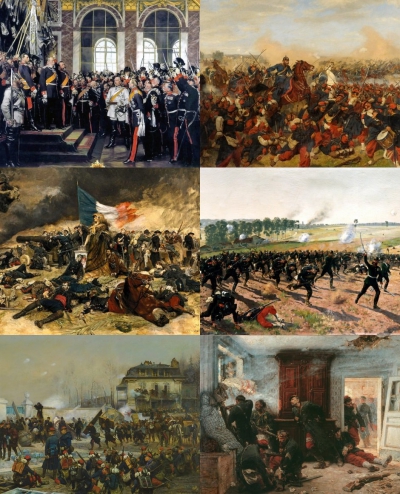Lon Gambetta (French: [le bta]; 2 April 1838 31 December 1882) was a French lawyer and republican politician who proclaimed the French Third Republic in 1870 and played a prominent role in its early government.
The Franco-Prussian War or Franco-German War, often referred to in France as the War of 1870, was a conflict between the Second French Empire and the North German Confederation led by the Kingdom of Prussia. Lasting from 19 July 1870 to 28 January 1871, the conflict was caused primarily by France's determination to reassert its dominant position in continental Europe, which appeared in question following the decisive Prussian victory over Austria in 1866. According to some historians, Prussian chancellor Otto von Bismarck deliberately provoked the French into declaring war on Prussia in order to induce four independent southern German states—Baden, Württemberg, Bavaria and Hesse-Darmstadt—to join the North German Confederation; other historians contend that Bismarck exploited the circumstances as they unfolded. All agree that Bismarck recognized the potential for new German alliances, given the situation as a whole.France mobilised its army on 15 July 1870, leading the North German Confederation to respond with its own mobilisation later that day. On 16 July 1870, the French parliament voted to declare war on Prussia; France invaded German territory on 2 August. The German coalition mobilised its troops much more effectively than the French and invaded northeastern France on 4 August. German forces were superior in numbers, training, and leadership and made more effective use of modern technology, particularly railways and artillery.
A series of swift Prussian and German victories in eastern France, culminating in the Siege of Metz and the Battle of Sedan, resulted in the French Emperor Napoleon III captured and the army of the Second Empire decisively defeated; a Government of National Defense was formed in Paris on 4 September and continued the war for another five months. German forces fought and defeated new French armies in northern France, then besieged Paris for over four months, before it fell on 28 January 1871, effectively ending the war.
In the waning days of the war, with German victory all but assured, the German states proclaimed their union as the German Empire under the Prussian king Wilhelm I and Chancellor Bismarck; with the notable exception of Austria, the vast majority of Germans were united under a nation-state for the first time in history. Following an armistice with France, the Treaty of Frankfurt was signed on 10 May 1871, giving Germany billions of francs in war indemnity, as well as most of Alsace and parts of Lorraine, which became the Imperial Territory of Alsace-Lorraine (Reichsland Elsaß-Lothringen).
The war had a lasting impact on Europe. By hastening the process of German unification, it significantly altered the balance of power on the continent; with the new German nation state supplanting France as the dominant European land power. Bismarck maintained great authority in international affairs for two decades, developing a reputation for adept and pragmatic diplomacy that raised Germany's global stature and influence. In France, it brought a final end to imperial rule and began the first lasting republican government. Resentment over France's defeat triggered a revolutionary uprising called the Paris Commune, which managed to seize and hold power for two months before its bloody suppression; the event would influence the politics and policies of the Third Republic.

1870Oct, 7
Franco-Prussian War: Siege of Paris: Léon Gambetta flees Paris in a hot-air balloon.
Choose Another Date
Events on 1870
- 15Jan
Thomas Nast
A political cartoon for the first time symbolizes the Democratic Party with a donkey ("A Live Jackass Kicking a Dead Lion" by Thomas Nast for Harper's Weekly). - 30Mar
Reconstruction Era
Texas is readmitted to the Union following Reconstruction. - 12May
Royal Assent
The Manitoba Act is given the Royal Assent, paving the way for Manitoba to become a province of Canada on July 15. - 18Jul
Papal infallibility
The First Vatican Council decrees the dogma of papal infallibility. - 19Sep
Siege of Paris (1870-71)
Franco-Prussian War: The Siege of Paris begins, which will result on January 28, 1871 in the surrender of Paris and a decisive Prussian victory.

 English
English  español
español  français
français  português
português  русский
русский  العربية
العربية  简体中文
简体中文 